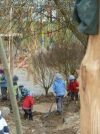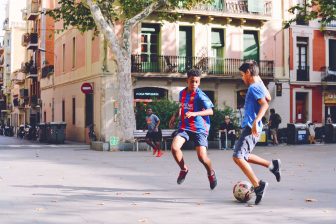
Participating in creating open spaces close to nature, with and for children
Planning and designing open spaces close to nature, with and for children, is more than just having nice open spaces for children. The participatory process is at least as valuable as the utilization of these spaces. The reasons for the process are related to topics such as education, health, competences and resources, spatial-societal identification, awareness of nature and experiencing democracy.
Child-friendly open spaces, close to nature, are important for children but are becoming increasingly rare in both urban and rural neighbourhoods. Especially in the urban context, the specialization and functionalization of public open spaces are increasing. Thus, child-friendly open spaces are either displaced to the outskirts of cities or are disappearing completely. As a result, children are losing important experiential spaces in their immediate neighbourhoods. This again can lead to the fragmentation, domestication and mediatisation of children’s living environments.
Besides these aspects, concerning the utilization of open spaces, there are different reasons why it is worthwhile investing in participatory processes, to design and implement open spaces close to nature for and with children.
Such participatory processes:
- … support the healthy development of children by providing a space for experience and learning.
- … strengthen the competencies and resources of children.
- … enable encounters and collaboration between people of different generations and origins.
- … support the identification with a space or place.
- … encourage people to tune in to nature and landscaping.
- … allow adults and children to experience democracy.
These six points document the experiences of a 3-year programme in Switzerland. To gain more insights into how to design and implement natural open spaces for children, we have implemented this programme including three community-based pilot projects.
In Switzerland we ran a 3-year programme with three community-based pilot projects to gain more insights on how to design and implement natural open spaces for children. The programme was aimed at intensifying participatory, ecological and educational goals within the processes of designing and implementing open spaces close to nature.



The most important lessons learned:
- Participatory processes with children make sense and are effective – but there are also challenges, obstacles and problems to resolve.
- Making an active contribution to designing and planning open spaces empowers children.
- Nature, and the experience of nature, strengthens children in various ways (e.g. physical and psychological health, awareness).
- Participatory processes in designing, planning and implementing child-friendly public open spaces are an important investment for today’s generation and future generations as well as in the community as a whole.
- Participatory processes related to public open spaces are on-going processes with various feedback loops. The entire process needs time, transparency and comprehensive communication.
The requirements for a successful participatory process in planning and implementing child-friendly open spaces are:
- The authorities have to be ready to support the process. The appropriate values have to be present or developed within the administration and with the various stakeholders.
- Such processes need time and human resources in several fields, namely participation, planning, implementation and communication.
- Participatory methods have to be locally adapted and tailored to the capabilities of children.
Author: Fabian Carlo, Senior Researcher, Project Leader and Lecturer, University of Applied Sciences and Arts Northwestern Switzerland (FHNW)
Photo Credit: photo by Fabian Carlo
Interested in hearing more on Fabian’s research? Join us at the Child in the City Conference in Ghent, Belgium on the 7-9th November!




